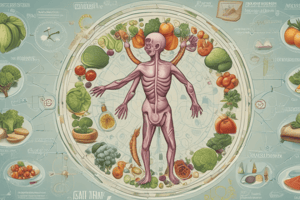Podcast
Questions and Answers
What is the primary focus of nutritional epidemiology?
What is the primary focus of nutritional epidemiology?
- Exploring the relationship between biology and chemistry
- Investigating neurological disorders
- Addressing nutritional deficiencies and excesses (correct)
- Analyzing global economic trends
What is a key component to include in a nutrition-focused research paper?
What is a key component to include in a nutrition-focused research paper?
- Introducing fictional characters
- Providing detailed explanations of experimental setup (correct)
- Ignoring the results section
- Including personal anecdotes
Which tip is essential when writing in biological sciences?
Which tip is essential when writing in biological sciences?
- Omitting the discussion section
- Avoid using visuals in presenting results
- Craft a compelling introduction (correct)
- Using informal language
Why is it important to use the right terminology in biology research papers?
Why is it important to use the right terminology in biology research papers?
How can researchers contribute to the advancement of knowledge in nutrition?
How can researchers contribute to the advancement of knowledge in nutrition?
What is the primary focus of nutrition science?
What is the primary focus of nutrition science?
Why is understanding nutrient absorption important in nutrition science?
Why is understanding nutrient absorption important in nutrition science?
How do nutrient requirements change throughout an organism's life stages?
How do nutrient requirements change throughout an organism's life stages?
What is the importance of exploring nutrient interactions in nutrition science?
What is the importance of exploring nutrient interactions in nutrition science?
Why are nutrients considered vital for living organisms?
Why are nutrients considered vital for living organisms?
Flashcards are hidden until you start studying
Study Notes
Decoding Nutrition in Biology
Nutrition, the science of food and its impact on living organisms, is a complex and vital aspect of biology. From microorganisms to humans, all life forms require nutrients to thrive and maintain their structure, function, and survival. As a foundational field in biology, nutrition encompasses a broad spectrum of scientific inquiries, from basic cellular processes to population-level health and well-being.
Key Concepts in Nutrition Science
In the study of nutrition, researchers delve into the following key concepts:
-
Nutrient requirements: Identifying the essential nutrients that organisms need to maintain healthy physiological functions and understand their sources.
-
Nutrient absorption and utilization: Investigating how nutrients enter and are processed by cells and tissues, leading to their incorporation into biological structures or their participation in metabolic processes.
-
Nutritional needs through life stages: Understanding the changing nutrient requirements throughout an organism's life stages, such as growth, maturity, and reproduction.
-
Nutrient interactions: Exploring how nutrients interact with each other, affecting their absorption, utilization, and biological effects, as well as their potential synergistic or antagonistic relationships.
-
Nutritional epidemiology and public health: Examining the relationship between diet, nutrition, and public health, addressing nutritional deficiencies and excesses, and recommending interventions to improve global health.
Writing a Nutrition-Focused Research Paper
When drafting a nutrition-focused biology research paper:
- Choose a well-supported and significant topic, based on solid scientific evidence.
- Follow a clear structure, including an abstract, introduction, materials and methods, results, discussion, and conclusion.
- Accurately record research methodology and material, providing detailed explanations of experimental setup, data collection methods, and statistical analyses.
- Use visuals, such as tables, figures, and graphs, to present results effectively and ensure they are easy to interpret and well-labeled.
- Create a robust discussion section that interprets results in light of the research question, demonstrates work's contribution to the field, addresses limitations, and proposes future research directions.
- Use the right terminology, following international conventions for scientific notation and common biology textbooks.
- Seek support from academic writing experts if needed.
Tips for Writing in Biological Sciences
- Identify your target journal and audience.
- Start with a clear structure.
- Craft a compelling introduction.
- Describe methods and frameworks thoroughly.
- Use visuals to present your results effectively.
- Create a robust discussion section.
- Use the right terminology.
- Follow ethical research and reporting practices.
- Seek support from academic writing experts.
Nutrition is a fascinating and multifaceted discipline within biology that connects basic cellular processes to global public health. By understanding the fundamental principles of nutrition, researchers can make valuable contributions to the advancement of our knowledge and the improvement of human well-being.
Studying That Suits You
Use AI to generate personalized quizzes and flashcards to suit your learning preferences.




